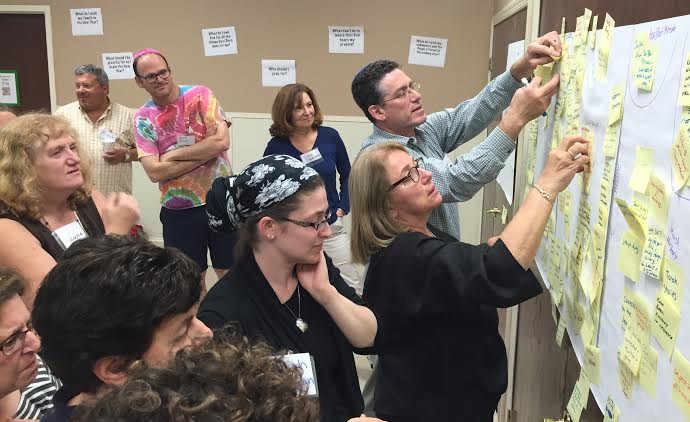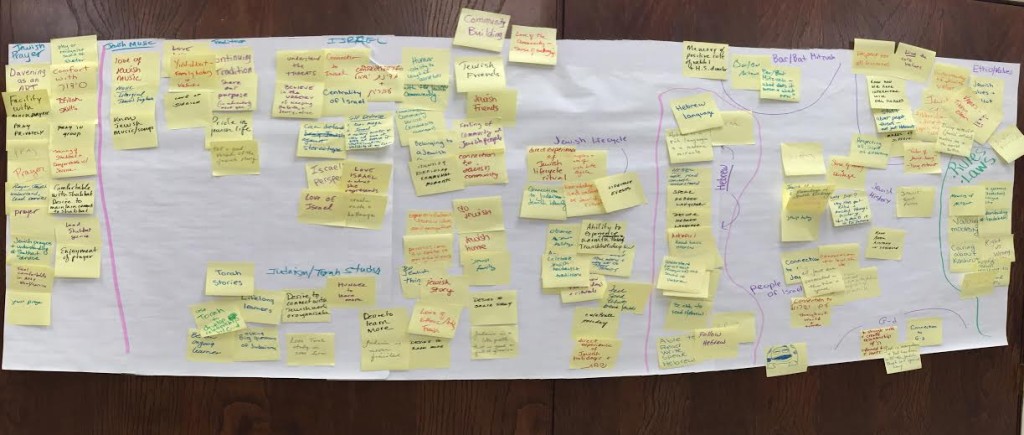Just what I needed in the busy week! Another meeting and the day after Yom Kippur, too. But the community wide workshop, “Reimagining Hebrew School”, intrigued me. As an educator with many years in both the public schools and supplemental schools, as a parent whose two daughters went through the Shomrei Emunah Hebrew School, and as a congregant concerned about the future, I was interested in what “reimagining” meant.
So, I decided to come but felt that I’d probably just “lurk,” something I’m quite good at.
However, Sara Shapiro-Plevan (SSP), the facilitator, would have none of that. I’ve been to many workshops where you introduce yourself, write down your ideas, put post-its on a wall, look over the ideas, categorize them, blah, blah, blah.
We did all that but Sara – one of four Sara(h)s present that evening – ran such a tight workshop and had such a smooth, soothing manner that no one could “lurk” and every person sitting around the table contributed. No passes this evening.
The entire Shomrei community was represented in the group of about twenty people gathered around the table: parents of preschoolers, JLC students, and recent JLC graduates; board members, clergy, JLC staff, and even interested congregants whose children are grown. And, of course, our intrepid president Nick Levitin was there, too, participating in what he called “A very valuable series of exercises.”
Some people had strong religious upbringing; others had none. Some attending the meeting had fond memories of Hebrew School; others cringed when remembering their own experiences. Some felt that their children had profited from their religious school education; others felt that their children had learned little. Some people had come back to Judaism; others were Jews by choice. What united the group was the mission to make Hebrew school more relevant to today’s kids and families and to define what works for our community
After sharing a religious school experience of our own or of a child we knew, we did some text study to focus in on the goals of religious education before individually listing what each of us felt graduates of our school should accomplish. Keeping “whole person learning” in mind, these items might be concrete skills or more intangible feelings.
Then we distilled our items to their essence, wrote them on post-its and stuck the post-its onto large sheets of paper. Our next task was to organize the topics into categories and then take a good look at those categories.
The facilitator constantly guided us, goaded us, and cajoled us to stay on task and to be open and honest with our ideas.
The buzz in the room signaled involvement and excitement.
The final step was when SSP shared what she had noted about the skills and goals that the group felt were important. We had heavily emphasized Hebrew and prayer skills; we barely mentioned the synagogue although we thought community was very important; we mentioned mitzvot, history, and a lot of fact- based topics.
Interestingly, this contrasted to what we talked about as we explained ourselves earlier in the evening: how many of us did not like Hebrew School, how many kids leave Hebrew School will minimal skills, how we want the school to help in developing the students’ positive view of Judaism and themselves as Jews and to become lifelong learners.
And overshadowing the conversation was the logistical conundrum of how to do all this in four hours a week. We began to realize that we can’t do it all.
SSP will now organize our ideas into essential questions that can guide the school and curriculum and be applicable to any student at any age and any skill level.
As for me, on a personal level, I was stimulated and enthused about being part of this conversation, proud of how this diverse group of people with often diametrically opposed backgrounds and experiences came together for the betterment of our community and our kids.
So, what’s the takeaway from this first session?
Though it may be an overused phrase, kids are our future. I-and others- felt overwhelmed and confused as to how we can do everything in limited time. But as SSP said you can’t do it all and the goal of this reimagining is to organize our school to do what we can do best and plant seeds for the future. Nick Levitin expressed it beautifully when he said, “My only hope is that more parents will be able to attend future discussions of this sort. It is essential to understanding what is, and what is not possible given the time allotted for Hebrew School education.”
How many of us graduated from religious school with the skills of an adult? I doubt if any of us emerged as fully developed Jewish adults when we left our respective Hebrew schools. We know as adults that it’s practice over the years that increases our skills, make us more comfortable with synagogue life and that it’s maturity that makes us more cognizant Jews.
So if we face reality and focus on just a few key goals, maybe we just might be able to develop a school for today’s kids that will help to inspire them to grow into tomorrow’s Jewish adults.
On Thursday evening September 26, we began the task. As Rabbi Tarfon says in Pirkei Avot: It is not incumbent upon you to complete the work, but neither are you at liberty to desist from it. (2:21) or as Nick Levitin put it, “The path in front of us is long and traversing it will take time, but this was an excellent beginning to the process.”
- Is It Passover Yet? - Thu, Apr 18, 2024
- MESH Report April 9, 2024 - Thu, Apr 11, 2024
- Guess Who? - Wed, Mar 13, 2024



Yasher Koach, Aileen. It was great to have you at the workshop and this is an excellent summation of the events that occurred at the meeting.
As a JLC parent, I am looking forward to the next steps in this process! Thanks so much for your article.
Aileen, this summary is just what I needed. Thank you.